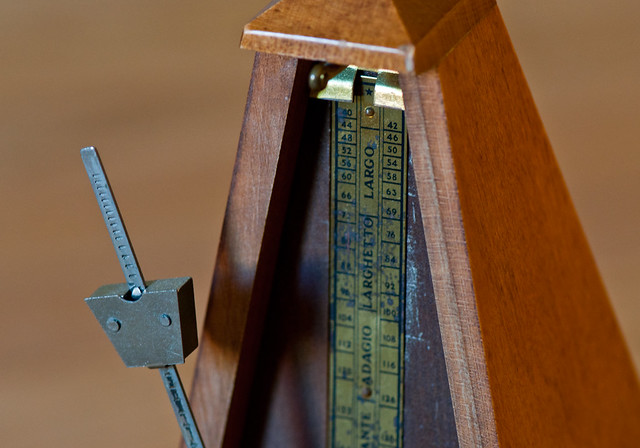
Listening to Our Own Rhythms
One of the things I like most about my life is believing every day is different. I appreciate and celebrate the promise and potential of each day. When we get tired or discouraged we can take comfort from listening to our own rhythms.
The creativity and variety of each day takes place within the rhythm of our lives. My rhythm allows for a good deal of flexibility. Other people have their days tightly wrapped in more intricate patterns. Some of us prefer life with a more open weave.
Some of us have chosen rhythms intentionally. Others were chosen by a rhythm of their own.
We follow daily rhythms which fit into each week and weekly rhythms which fit into each month. The patterns of our years fit together into the everyday rhythm of our lives.
Monastic Rhythms
Monks’ lives follow sacred rhythms. Each day consists of time for reflection and labor, worship and rest, learning and thinking.
The rhythms of Benedictine life are described in Benedict’s Rule. Benedict outlines how monks spend each day with specific ideas about balancing their schedules. He sets out how monks are to work for the economic health of the community. The rule also provides for a pattern of worshiping together, reflecting, and rest.
Benedictine lives have a changing, growing rhythm of daily and weekly responsibilities. The patterns of monks’ duties change as they take on and give up tasks.
Each day has an ebb and flow from rest to work and back. Like the phases of the moon or the tides, monastic life shifts and adjusts over time. While the days may follow a similar schedule, the rhythm of each day is uniquely its own.
The rhythm of each monk’s day and of the community fit together to strengthen both. There is time for what is important, what is essential. Nothing is wasted.
Each local community understands Benedict’s Rule in its own way. Each member of the community is responsible for their own rhythm.
Unrecognized Rhythms
We may not much put much energy into listening to our own rhythms. For us, things just happen.
It can be easy for us to get the sense we are driven from one project to the next. It feels like we move through life reacting to one thing after another, without a rhythm. We may see ourselves as being at the beck and call of anyone who says they need us.
Life becomes a process of skimming along the surface. We may lose sight of the deep rhythms below the surface.
Our lives may be unpredictable and we need to be flexible. Losing touch with our own rhythms of life, though, takes away our opportunities to rest. When we flit from one thing to another, one person to another, we miss out on what is important. We fail to recognize and appreciate the deep rhythms which make us who we are.
There may be times when we know something is missing but we cannot put our finger on it. Something is not right, something does not fit, but we just cannot see it. It is as if we are out of sync with ourselves.
We need to feel the rhythms of our lives, to know them and remember them. There may be a great deal we know about our own rhythms, but we need to experience them. It is essential for us to know how they feel.
It can help for us to spend some time each day staying in touch with our own rhythms.
Unforced Rhythms of Grace
We do not need to establish or enforce someone else’s artificial rhythms for us.
The rhythms we see in Benedict’s Rule are not imposed on monks from outside. The monastic time management Benedict describes is not designed to be a burden. Monastic life facilitates community for contemplative people and practices.
Most people are not living in malevolent or deleterious rhythms. It is not that we are rhythmically wrong each day and are trying to fix ourselves. For many of us, the discomfort we feel comes from a dissonance or not recognizing our rhythms.
We realize we have lost touch with the rhythm of our lives and try to impose a new one.
People look in lots of places to find the rhythm they no longer feel within themselves. Some of us put our heads down and try to push our way through what we feel. Others lose hope and surrender, assuming they just need to live without rhythm now. Some may look for a healthy rhythm in their relationships to other people. I know people who try to feel the rhythm of their lives through other artificial means.
The healthiest rhythms I have found come from within me. As I pause to listen and take deep breaths, I find myself resonating with deep rhythms around me. I do not need to force myself into someone else’s rhythm, but relax back into my own.
Restoring Everyday Rhythms
As I work with people who are not monks it can help to apply lessons monks have taught me.
First, it is important for us to find and restore our own rhythm before we help someone else. If we cannot feel the deep rhythms which give us life, how can we help strengthen anyone else?
Second, we need to restore our appreciation for the rhythms of life more than once a day. It is helpful for me to set specific times throughout the day, like the monks do, to remember.
Third, it is not about finding the right or the perfect rhythm. It is about finding our own rhythms. we are not trying to impose own rhythms on anyone else, but trying to remember.
Fourth, it is not surprising when we forget and lose touch with ourselves. We are surrounded by distractions. It is easy to lose contact. The key is remembering to reconnect.
How do we find, and restore, our own everyday rhythms?
When will we pause to listen and take deep breaths today?
[Image by jronaldlee]
Greg Richardson is a spiritual director in Southern California. He is a recovering assistant district attorney and associate university professor and is a lay Oblate with New Camaldoli Hermitage near Big Sur, California. Greg’s website is http://StrategicMonk.com and his email address is [email protected].












